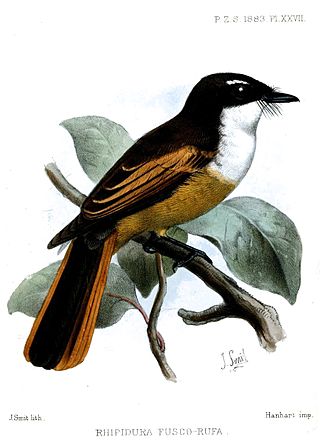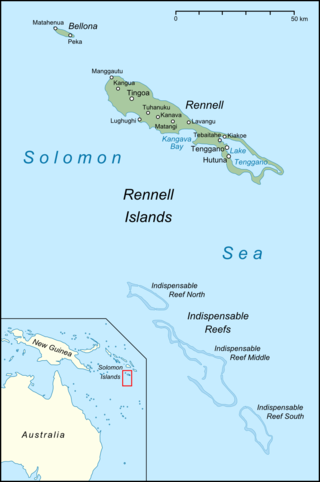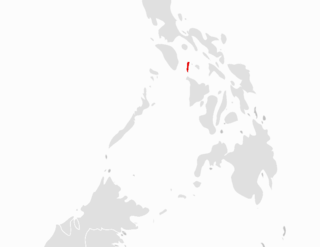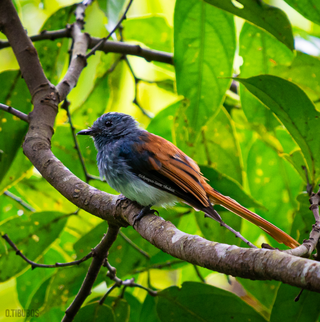
Fantails are small insectivorous songbirds of the genus Rhipidura in the family Rhipiduridae, native to Australasia, Southeast Asia and the Indian subcontinent. Most of the species are about 15 to 18 cm long, specialist aerial feeders, and named as "fantails", but the Australian willie wagtail is a little larger, and, though still an expert hunter of insects on the wing, concentrates equally on terrestrial prey.

The Australian rufous fantail is a small passerine bird, most commonly known also as the black-breasted rufous-fantail or rufous-fronted fantail, which can be found in Australia.

The Pohnpei fantail is a fantail, known as Likepsir in Pohnpeian, which is endemic to the Pacific island of Pohnpei in the Federated States of Micronesia. It is a bird commonly found in forests and at forest edges. It feeds on insects which it gathers by gleaning amongst foliage or by making short dashes while in the air.

The Malaita fantail is a fantail endemic to Malaita in the Solomon Islands.

The blue-headed fantail is a fantail endemic to the northern Philippines where it is found on the islands of Luzon and Catanduanes. Until recently, it was considered conspecific with the Tablas fantail and Visayan fantail.

The cinnamon-tailed fantail is a fantail restricted to the Banda Sea Islands of Indonesia.

The streak-breasted fantail is a species of bird in the family Rhipiduridae. It is endemic to Indonesia, where it occurs in Seram Island. Its natural habitats are subtropical or tropical moist lowland forests and subtropical or tropical moist montane forests.

The Palau fantail is a species of bird in the fantail family Rhipiduridae. It is endemic to Palau.

The white-bellied thicket fantail is a species of bird in the family Rhipiduridae. This species is one of 47 in the genus Rhipidura. It is found in New Guinea. Its natural habitats are subtropical or tropical moist lowland forests and subtropical or tropical mangrove forests.

The black thicket fantail is a species of bird in the family Rhipiduridae. It is found in the Aru Islands and New Guinea. This species is one of 47 in the genus Rhipidura.

The Samoan fantail is a species of bird in the family Rhipiduridae. It is endemic to Samoa and is found in Upolu and Savaiʻi islands.

The Kadavu fantail is a species of bird in the fantail family Rhipiduridae. It is endemic to Kadavu and Ono in the Kadavu archipelago, in southern Fiji. It is closely related to the streaked fantail of the rest of Fiji, and forms a superspecies with the numerous island species of fantail ranging from the Solomon Islands to Samoa.

The Rennell fantail is a species of bird in the family Rhipiduridae. It is endemic to Rennell Island.

The New Caledonian streaked fantail is a species of bird in the family Rhipiduridae. It is endemic to New Caledonia, and the Loyalty Islands. Its natural habitats are subtropical or tropical moist lowland forests and subtropical or tropical moist montane forests. It was formerly considered as conspecific with the Vanuatu streaked fantail and the Fiji streaked fantail with the English name "streaked fantail".
The Makira fantail or dusky fantail is a species of bird in the family Rhipiduridae. It is endemic to the Solomon Islands.

The sooty thicket fantail is a species of bird in the family Rhipiduridae. It is found in New Guinea.

The Arafura fantail, sometimes known as the wood fantail, inhabits the Lesser Sunda Islands, the northern coast of Australia from the Kimberley to the western side of the Cape York Peninsula, including subcoastally in the Top End of the Northern Territory, and southern New Guinea. It is similar to the rufous fantail, from which it has been split taxonomically but, apart from minor overlap in the eastern Moluccas, their geographic ranges are discrete. It is generally duller than the rufous fantail with the rufous colouration more restricted.

The New Zealand fantail is a small insectivorous bird, the only species of fantail in New Zealand. It has four subspecies: R. f. fuliginosa in the South Island, R. f. placabilis in the North Island, R. f. penita in the Chatham Islands, and the now-extinct R. f. cervina formerly on Lord Howe Island. It is also known by its Māori names, pīwakawaka, tīwakawaka or piwaiwaka, and the Chatham Island subspecies by the Moriori name tchitake; the common pied morph is also known as pied fantail, and the uncommon dark morph is also known as black fantail. The species has been considered by many to be conspecific as the grey fantail of Australia and New Caledonia; however, due to significant differences in its calls, many authorities now treat it as a separate species.

The Tablas fantail is a fantail endemic to the Philippines on Tablas Island. Until recently, it was considered conspecific with the blue-headed fantail and Visayan fantail. It is threatened by habitat loss.

The Visayan fantail is a fantail endemic to the Philippines on islands of Negros, Panay, Guimaras, Masbate and Ticao. Until recently, it was considered conspecific with the blue-headed fantail and Tablas fantail.




















